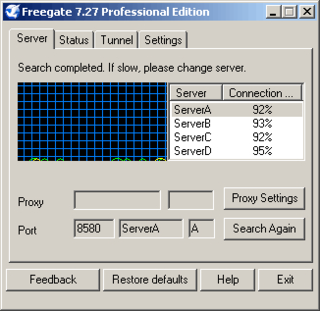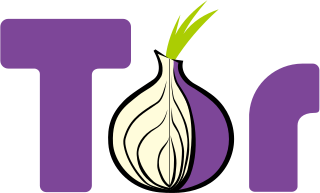 W
WTribler is an open source decentralized BitTorrent client which allows anonymous peer-to-peer by default. Tribler is based on the BitTorrent protocol and uses an overlay network for content searching. Due to this overlay network, Tribler does not require an external website or indexing service to discover content. The user interface of Tribler is very basic and focused on ease of use instead of diversity of features. Tribler is available for Linux, Windows, and OS X.
 W
WTails, or The Amnesic Incognito Live System, is a security-focused Debian-based Linux distribution aimed at preserving privacy and anonymity. All its incoming and outgoing connections are forced to go through Tor, and any non-anonymous connections are blocked. The system is designed to be booted as a live DVD or live USB, and will leave no digital footprint on the machine unless explicitly told to do so. The Tor Project provided financial support for its development in the beginnings of the project. Tails comes with UEFI Secure Boot.
 W
WFreegate is a software application developed by Dynamic Internet Technology (DIT) that enables internet users from mainland China, South Korea, North Korea, Syria, Vietnam, Iran, United Arab Emirates, among others, to view websites blocked by their governments. The program takes advantage of a range of proxy servers called Dynaweb. This allows users to bypass Internet firewalls that block web sites by using DIT's Peer-to-peer (P2P)-like proxy network system. FreeGate's anti-censorship capability is further enhanced by a new, unique encryption and compression algorithm in the versions of 6.33 and above. Dynamic Internet Technology estimates Freegate had 200,000 users in 2004. The maintainer and CEO of DIT is Bill Xia.
 W
WFreenet is a peer-to-peer platform for censorship-resistant communication. It uses a decentralized distributed data store to keep and deliver information, and has a suite of free software for publishing and communicating on the Web without fear of censorship. Both Freenet and some of its associated tools were originally designed by Ian Clarke, who defined Freenet's goal as providing freedom of speech on the Internet with strong anonymity protection.
 W
WGNUnet is a software framework for decentralized, peer-to-peer networking and an official GNU package. The framework offers link encryption, peer discovery, resource allocation, communication over many transports and various basic peer-to-peer algorithms for routing, multicast and network size estimation.
 W
WJava Anon Proxy (JAP) also known as JonDonym, is a proxy system designed to allow browsing the Web with revocable pseudonymity. It was originally developed as part of a project of the Technische Universität Dresden, the Universität Regensburg and Privacy Commissioner of the state of Schleswig-Holstein. The client-software is written in the Java programming language.
 W
WLantern is a free peer-to-peer internet censorship circumvention tool, used for casual web browsing. It provides a way to bypass state-sanctioned filtration through a network of trusted users, but it's not an anonymity tool like Tor. Using Lantern, users in countries having free internet access can share their bandwidth with those who are in countries where the network is partly blocked. Network connections will be dispersed between multiple computers running Lantern so it will not put undue stress on a single connection or computer.
 W
WMarabunta is a fully distributed software application for anonymous P2P. The main goal is the fight against internet censorship and assuring the freedom of speech. It is a peer-to-peer platform for information exchange among nodes in an anonymous way based on several communication algorithms called "Order and Chaos" which can be found in massive social organizations such as ant colonies.
 W
WMix networks are routing protocols that create hard-to-trace communications by using a chain of proxy servers known as mixes which take in messages from multiple senders, shuffle them, and send them back out in random order to the next destination. This breaks the link between the source of the request and the destination, making it harder for eavesdroppers to trace end-to-end communications. Furthermore, mixes only know the node that it immediately received the message from, and the immediate destination to send the shuffled messages to, making the network resistant to malicious mix nodes.
 W
WMixminion is the standard implementation of the Type III anonymous remailer protocol. Mixminion can send and receive anonymous e-mail.
 W
WNetShade is an app for Mac OS X and iOS which provides access to anonymous proxy and VPN servers. These servers include public HTTP/HTTPS proxies, as well as Rayner Software's own subscription-based proxies. NetShade's VPN servers run IPSec, and the proxy servers act using the HTTP/HTTPS web proxy standard.
 W
WPublic-key cryptography, or asymmetric cryptography, is a cryptographic system that uses pairs of keys: public keys, which may be disseminated widely, and private keys, which are known only to the owner. The generation of such keys depends on cryptographic algorithms based on mathematical problems to produce one-way functions. Effective security only requires keeping the private key private; the public key can be openly distributed without compromising security.
 W
WSyndie is an open-source cross-platform computer application to syndicate (re-publish) data over a variety of anonymous and non-anonymous computer networks.
 W
WTor is free and open-source software for enabling anonymous communication by directing Internet traffic through a free, worldwide, volunteer overlay network consisting of more than seven thousand relays in order to conceal a user's location and usage from anyone conducting network surveillance or traffic analysis. Using Tor makes it more difficult to trace the Internet activity to the user: this includes "visits to Web sites, online posts, instant messages, and other communication forms". Tor's intended use is to protect the personal privacy of its users, as well as their freedom and ability to conduct confidential communication by keeping their Internet activities unmonitored.
 W
WTor Mail is a former Tor hidden service that went offline in August 2013 after an FBI raid on Freedom Hosting. The service allowed users to send and receive email anonymously, to email addresses inside and outside the Tor network.
 W
WTurtle was a free anonymous peer-to-peer network project being developed at the Vrije Universiteit in Amsterdam, involving professor Andrew Tanenbaum. It is not developed anymore. Like other anonymous P2P software, it allows users to share files and otherwise communicate without fear of legal sanctions or censorship. Turtle's claims of anonymity are backed by two research papers provided in the "external links" below.
 W
WTwister is free software for experimental peer-to-peer microblogging. Being completely decentralized means that no one is able to shut it down, as there is no single point to attack. The system uses end-to-end encryption to safeguard communications. It is based on both BitTorrent and Bitcoin-like protocols and is considered a (distributed) Twitter clone.
 W
WWebTorrent is a peer-to-peer (P2P) streaming torrent client written in JavaScript by Feross Aboukhadijeh, who also created YouTube Instant, and the team at WebTorrent and on GitHub, for use in web browsers, as well as a WebTorrent Desktop stand alone version able to bridge WebTorrent and BitTorrent serverless networks.
 W
WxB Browser was a web browser designed to run on both the Tor and XeroBank anonymity networks, and is available as component of the xB Machine and the xB Installer.
 W
WYaCy is a free distributed search engine, built on principles of peer-to-peer (P2P) networks. Its core is a computer program written in Java distributed on several hundred computers, as of September 2006, so-called YaCy-peers. Each YaCy-peer independently crawls through the Internet, analyzes and indexes found web pages, and stores indexing results in a common database which is shared with other YaCy-peers using principles of P2P networks. It is a search engine that everyone can use to build a search portal for their intranet and to help search the public internet clearly.
 W
WZeroNet is a decentralized web-like network of peer-to-peer users, created by Tamas Kocsis in 2015. Programming for the network is based in Budapest, Hungary; is built in Python; and is fully open source. Instead of having an IP address, sites are identified by a public key. The private key allows the owner of a site to sign and publish change, which propagate through the network. Sites can be accessed through an ordinary web browser when using the ZeroNet application, which acts as a local webhost for such pages. In addition to using bitcoin cryptography, ZeroNet uses trackers from the BitTorrent network to negotiate connections between peers. ZeroNet is not anonymous by default, but it supports routing traffic through the Tor network.
 W
WZeroTier Inc. is a software company with a freemium business model based in Irvine, California. ZeroTier provides proprietary software, SDKs and commercial products and services to create and manage virtual software defined networks. The company's flagship end-user product ZeroTier One is a client application that enables devices such as PCs, phones, servers and embedded devices to securely connect to peer-to-peer virtual networks.